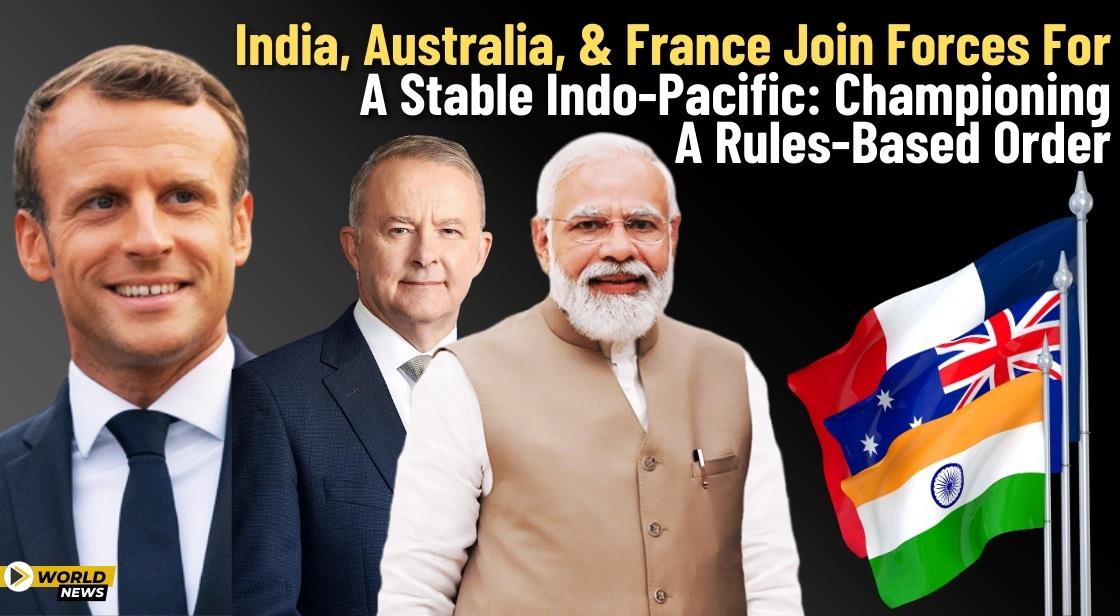India, Australia, and France Join Forces for a Stable Indo-Pacific: Championing a Rules-Based Order

News Synopsis
India, Australia, and France held their third trilateral meeting in Delhi on Wednesday, emphasizing their commitment to a free, open, inclusive, and rules-based Indo-Pacific region. This collaboration comes amidst rising concerns about China's growing influence in the strategic region.
A United Front for a Stable Indo-Pacific
The discussions focused on strengthening trilateral cooperation across three key pillars:
-
Maritime Safety and Security: This pillar underscores the importance of maintaining a secure maritime environment in the Indo-Pacific, vital for trade and regional stability.
-
Marine and Environmental Cooperation: Collaboration on issues like sustainable fishing practices, marine pollution control, and oceanographic research is crucial for preserving the delicate marine ecosystems of the Indo-Pacific.
-
Multilateral Engagement: The three nations acknowledged the importance of working together within existing regional frameworks like the Indo-Pacific Oceans Initiative (IPOI) and the Indian Ocean Rim Association (IORA) to achieve common goals.
The meeting also explored new avenues for collaboration within these established mechanisms.
Countering China's Influence: The IPOI Initiative
The Indo-Pacific Oceans Initiative (IPOI), championed by India, serves as a platform for like-minded countries to cooperate on maritime issues. This initiative promotes a collaborative approach to managing, conserving, and securing the vast Indo-Pacific maritime domain, fostering a rules-based order that challenges China's unilateral assertiveness in the region.
The Indian Ocean Rim Association (IORA) provides another avenue for regional cooperation, focusing on broader issues like trade, tourism, and economic development.
Building Bridges: Strengthening Trilateral Ties
The high-level delegations from each nation participated in the meeting. India's team was led by Piyush Srivastava (Joint Secretary, Europe West) and Paramita Tripathi (Joint Secretary, Oceania and Indo-Pacific) from the Ministry of External Affairs (MEA). France was represented by Benot Guide, Director (Asia and Oceania) of the French Foreign Ministry. The Australian delegation was headed by Sarah Storey, First Assistant Secretary of the South and Central Asia Division in the Australian Department of Foreign Affairs and Trade.
This trilateral meeting signifies a growing strategic partnership between India, Australia, and France. Their commitment to a rules-based Indo-Pacific order presents a united front against China's attempts to dominate the region through economic coercion and military expansion. By fostering cooperation on maritime security, environmental issues, and regional development, these three democracies aim to ensure a stable and prosperous Indo-Pacific for all stakeholders.
Conclusion: A United Front for a Secure and Prosperous Indo-Pacific
The trilateral meeting between India, Australia, and France serves as a significant step towards a more stable and secure Indo-Pacific region. By prioritizing cooperation on maritime security, environmental protection, and regional development, these three democracies are sending a strong message in favor of a rules-based order.
This strategic partnership offers several key benefits:
-
Countering Unilateralism: A united front against China's attempts to dominate the Indo-Pacific through economic coercion and military expansion can help maintain a balance of power in the region.
-
Promoting Regional Stability: Enhanced maritime security cooperation can deter piracy, illegal fishing, and other threats to regional stability.
-
Preserving the Environment: Collaboration on marine and environmental issues is crucial for protecting the delicate ecosystems of the Indo-Pacific Ocean.
-
Ensuring Economic Growth: A stable and peaceful Indo-Pacific is vital for fostering regional trade and economic development.
The success of this trilateral partnership hinges on continued dialogue, joint exercises, and the implementation of concrete initiatives. As India, Australia, and France work together, they can create a model for broader regional cooperation in the Indo-Pacific, ensuring a future where all nations can benefit from a free, open, and inclusive order.
You May Like









